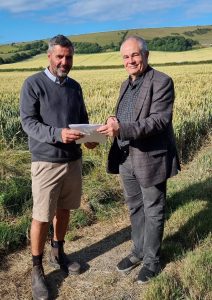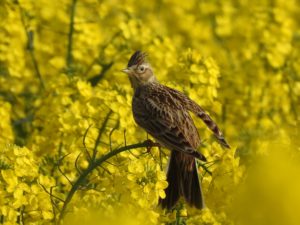Groundbreaking agreement with farm in South Downs National Park will bring boost for nature
October 26, 2023
A landmark agreement has been signed that marks the first step towards creating large new areas of habitat for wildlife in the South Downs National Park.
Thirty one hectares of land – almost 50 football pitches – at Iford Estate, in East Sussex, have been signed over for nature recovery.
The large swathe of downland is the first to appear on the National Park Authority’s register of land that is formally dedicated for “Biodiversity Net Gain” (BNG) provision.
 It comes as new planning reforms will make BNG a legal requirement.
It comes as new planning reforms will make BNG a legal requirement.
From January 2024 developers in England will be required to deliver 10% “Biodiversity Net Gain” when building new housing, industrial or commercial developments. This means by law they must deliver a net positive for the local environment, for example by creating new habitats and green spaces.
The nature restoration can happen on-site or off-site at locations such as the Iford Estate, or other potential areas that could be earmarked in the National Park in the future.
The 31 hectares is just the start for the Iford estate. The 1,200ha estate, near Lewes, has an ambitious 30-year landscape-scale vision with nature recovery at its heart, using BNG as the main vehicle for securing the necessary investment.
The ‘Iford Biodiversity Project’ will ultimately see about 800ha of land permanently dedicated to nature recovery, involving the generation of about 3,000 biodiversity units.
The plan involves the creation of floodplain grazing marsh to provide habitat for breeding and overwintering waders, species-rich grassland for rare plants, insects and mammals, as well as tree planting on parts of the farm to link up with existing woodland.
The National Park Authority hopes that other major landowners may follow suit and dedicate areas for BNG.
Developers can also now get in touch with the National Park Authority to purchase biodiversity units.
Nick Heasman, Countryside and Policy Manager at the National Park, said: “This is a major step forward for the National Park’s ReNature initiative, which is looking to create 13,000 hectares of new habitat to help wildlife flourish.
“Biodiversity loss and climate change are two of the biggest long-term issues facing our country and this innovative scheme at Iford will kickstart a regional recovery that will benefit both nature and local communities.”
The National Park’s brokerage service, officially called “ReNature Credits”, hopes to connect landowners and developers to create areas of land for nature recovery.
Nick added: “As a National Park covering 1,600km2 and with over 1,000 different landowners, we can identify the very best areas for biodiversity restoration and ensure habitat connectivity.
“We want to be very clear that this is not about incentivising more development in and around the National Park. This innovative scheme will ensure that the sustainable development that does take place over the next decade will benefit nature and people locally, funneling private investment into the places where it’s needed most. With mandatory Biodiversity Net Gain coming into force, now is a great time to get in touch with the National Park Authority about acquiring credits and giving back to nature.
“As this scheme grows over the next few years, it will also create a number of new green jobs in the sector.”
Trevor Beattie, Chief Executive of the South Downs National Park Authority, said: “Last month’s State of Nature report showed just how much biodiversity needs our help to bounce back.
“This groundbreaking scheme offers a long-term solution to creating the bigger and better habitats that nature so badly needs.”
The partnership with the Iford Estate is in the form of a Section 106 Agreement – a recognised legal arrangement in planning where developers contribute towards community or environmental benefits.
 Iford Estate Manager Ben Taylor said: “Our scheme draws on the extensive habitat and species surveys conducted over the past few years, as well as historical mapping to determine land use patterns, soil sampling and hydrological assessments.
Iford Estate Manager Ben Taylor said: “Our scheme draws on the extensive habitat and species surveys conducted over the past few years, as well as historical mapping to determine land use patterns, soil sampling and hydrological assessments.
“This is already a diverse and inspirational landscape, with recent surveys showing over 1,300 species present on the Estate, many with conservation status, including 155 species of birds of which 87 are of conservation concern.
“We will increase the diversity of species over the whole estate, whilst still retaining food production as the principal land use on the most fertile land.”
To acquire credits or to get in touch with the National Park’s team delivering ReNature Credits, visit www.southdowns.gov.uk/renature-credits/
To see a detailed FAQ explaining the scheme, visit www.southdowns.gov.uk/renature-credits/faqs/
Pictures: Iford Estate Manager Ben Taylor and the National Park Authority’s Chief Executive Trevor Beattie sign the agreement that will bring a boost for wildlife in the region.
Skylark in South Downs by Sara Humphrey.
- Iford Estate is a 1,200ha (3,000 acre) mixed farm situated wholly within the South Downs National Park, near Lewes in Sussex. The principal enterprises are the production of cereals and beef, alongside a diverse range of properties and leisure facilities. The estate has also placed a strong focus on protecting and enhancing the environment – and aims to become an exemplar landscape restoration project. Find out more here www.ifordbiodiversityproject.co.uk
- Biodiversity Net Gain is an approach to development that aims to leave the natural environment in a “measurably better” state than it was beforehand. It can include planting trees and creating new areas for animals to live such as ponds, hedgerows and meadows
